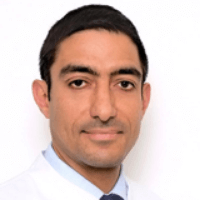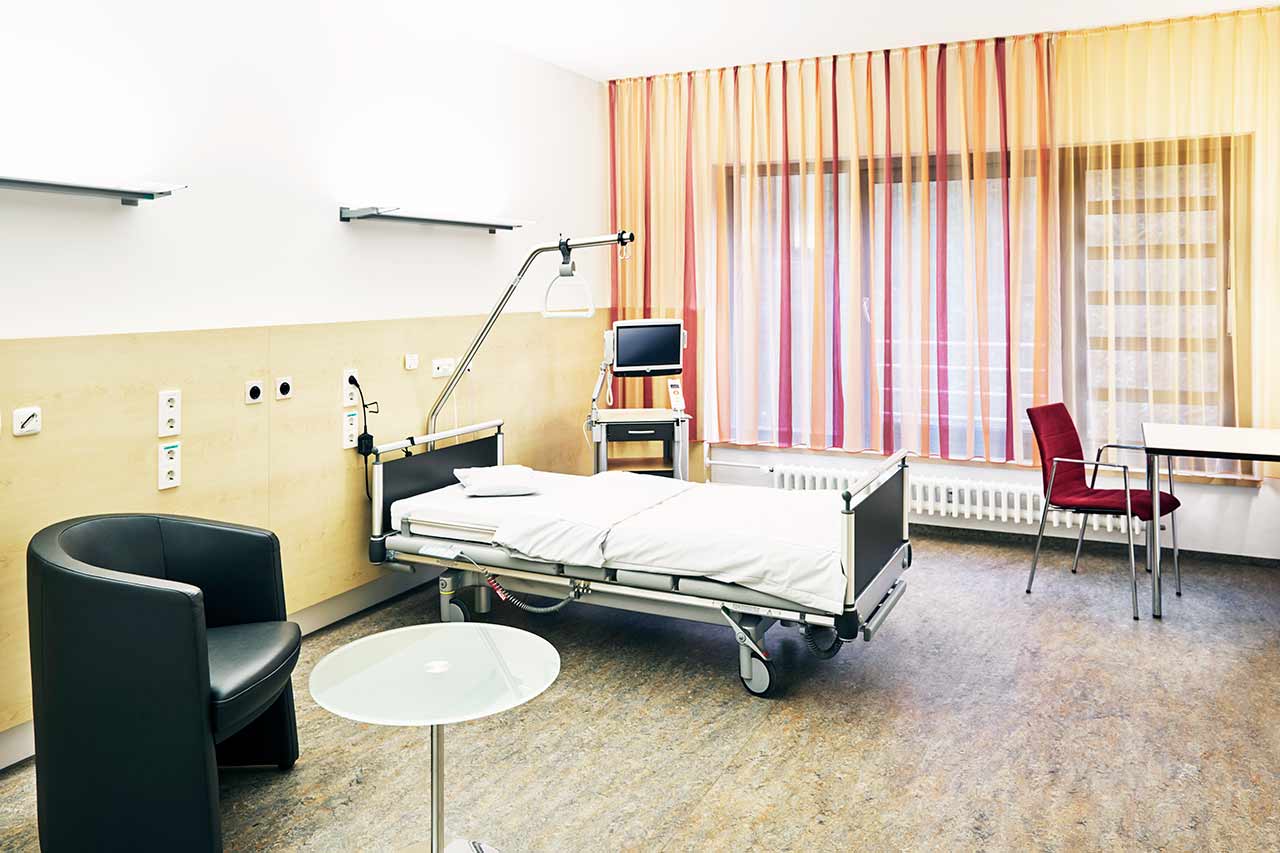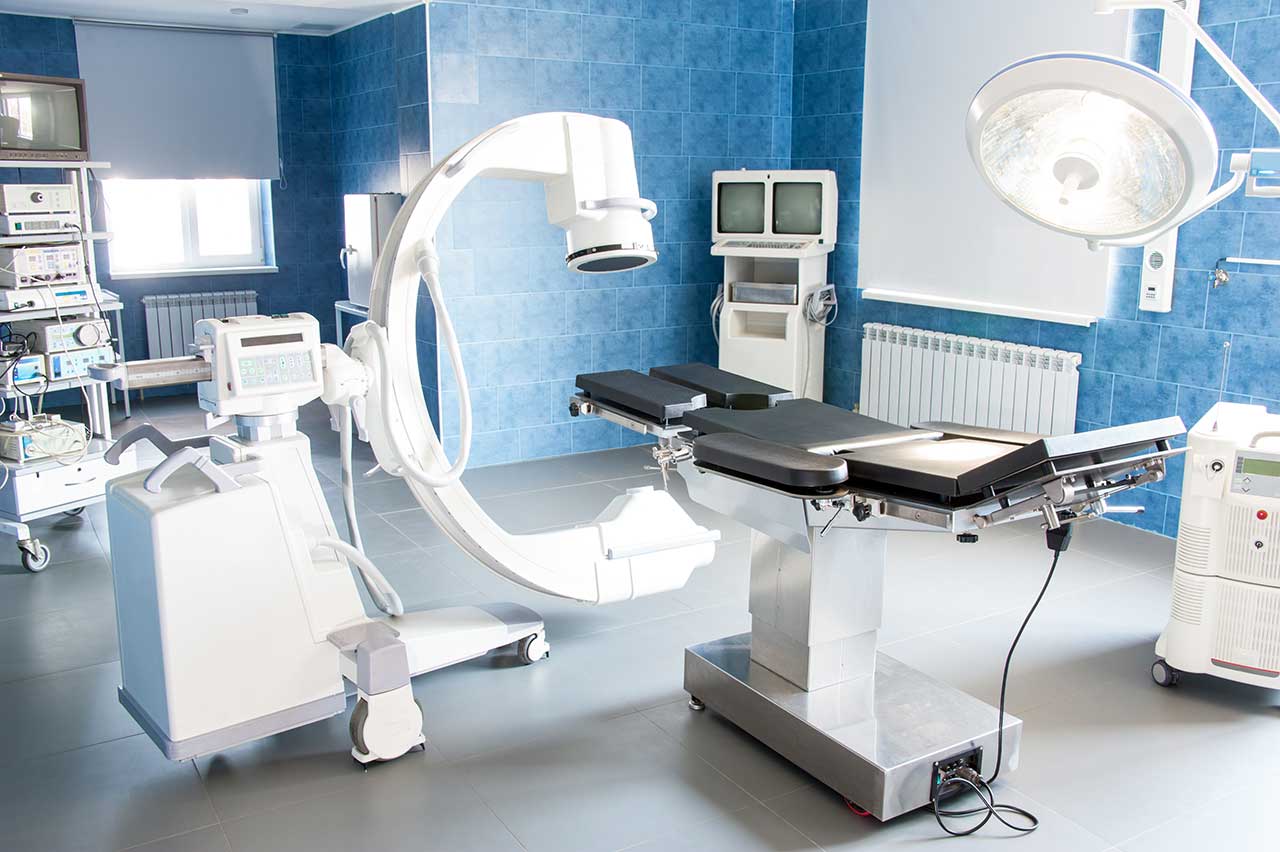
The program includes:
- Initial presentation in the clinic
- clinical history taking
- review of medical records
- physical examination
- laboratory tests:
- complete blood count
- biochemical analysis of blood
- indicators of inflammation
- indicators blood coagulation
- ophthalmologic examination:
- slit-lamp examination
- pupil function tests
- ocular motility test
- ophthalmoscopy
- perimetry (visual field test)
- computer perimetry
- visometry (without correction and with correction)
- keratometry
- pachymetry
- refractometry (objective, subjective, cycloplegic)
- autorefractometry
- non-contact tonometer
- biomicroscopy
- preparation according to preoperative standard
- corneal transplantation
- symptomatic treatment
- control examinations
- the cost of essential medicines and materials
- nursing services
- explanation of future recommendations
Required documents
- Medical records
Service
You may also book:
 BookingHealth Price from:
BookingHealth Price from:
About the department
The Department of Adult and Pediatric Ophthalmology at the Marien Hospital Duesseldorf offers the full range of medical services to patients with diseases of the eye and its appendages. It provides outpatient and inpatient treatment. The department offers innovative laser technologies for non-surgical correction of vision defects, and surgical interventions on the eye are also successfully performed here. Of particular interest to the doctors of the medical facility are the surgical treatment of cataracts and glaucoma, corneal transplantation, minimally invasive and seamless operations on the retina and vitreous body, operations for diseases of the eyelids and lacrimal ducts, as well as the treatment of macular degeneration and correction of strabismus. Most surgical interventions are performed on an outpatient basis. The department has two modern operating rooms, as well as a station with 10 beds for inpatients. The quality of surgical interventions meets the requirements of the TÜV ISO 9001:2008 international certificate. The Head Physician of the department is Prof. Dr. med. Babac Mazinani.
Cataract is one of the most common diagnoses in the department's clinical practice. Pathology is a complete or partial clouding of the lens, which causes a significant vision deterioration or its complete loss. In most cases, the lens is deformed and loses its transparency due to the age-related changes. As of today, the only effective treatment method for mature cataracts is a surgical intervention. In some cases, the department's doctors prescribe drugs to slow down the progression of the pathological process, but in the end, the surgical intervention is inevitable. The department's specialists perform cataract surgery using the very latest minimally invasive surgical techniques. The essence of the operation is to remove the clouded lens and to replace it with a special implant. The department uses all modern types of artificial lenses (the so-called intraocular lenses), including toric intraocular lenses, multifocal intraocular lenses, aspherical intraocular lenses, intraocular lenses with filters and others. The most suitable type of intraocular lens is chosen by the attending physician at the stage of preparation for surgery, based on the results of an eye examination.
Many patients come to the department for glaucoma treatment. This ophthalmic disease develops due to elevated intraocular pressure, as a result of which the outflow of aqueous humor worsens and optic nerve atrophy occurs. All these pathological changes provoke blindness. The insidiousness of glaucoma is that in the early stages of the disease the patient has no complaints. The department's ophthalmologists perform both conservative and surgical treatment of glaucoma. Drug therapy is effective only in the early stages – during this period, doctors prescribe drugs to normalize intraocular pressure, metabolism and aqueous humor outflow. Surgery is usually considered in the absence of positive dynamics at the end of the course of drug therapy or in the advanced stages of glaucoma. Penetrating, non-penetrating and microsurgical interventions are performed in the operating rooms of the medical facility using innovative stents: Titan-i-stent, Hydrus Microstent, XEN and Preseflo. Surgical treatment using modern technologies provides a minimal risk of side effects and a rapid restoration of vision after surgery. With appropriate indications, the department also performs laser treatment of glaucoma.
The department's medical team is rightfully proud of its successful experience in the treatment of corneal diseases. The pathologies of this spectrum are quite often treated with the help of partial or total replacement of the cornea with a donor one. In case of partial damage to the cornea, the department's specialists resort to lamellar keratoplasty, which consists in replacing only the damaged corneal layers. Penetrating keratoplasty is performed when it is necessary to totally replace the cornea with a donor one. A special area of competence of the department's ophthalmologists is the transplantation of the inner layer of the cornea (endothelium) using the DMEK procedure. The DMEK technique can significantly reduce the postoperative recovery period, and also provides high visual acuity.
The department admits young patients with eye diseases. Particular attention is paid to the early detection and correction of strabismus in children. In addition, the doctors effectively treat myopia and amblyopia in children. The treatment regimen is developed for each young patient on an individual basis and discussed with the parents.
The department's range of medical services includes:
- Diagnostics and treatment of diseases of the anterior segment of the eye
- Cataract treatment
- Modern microsurgical techniques
- Implantation of special intraocular lenses (toric, multifocal, aspherical, lenses with a filter)
- Glaucoma treatment
- Laser surgical procedures
- Non-penetrating and microinvasive procedures (implantation of Titan-i-stent, Hydrus Microstent, XEN and Preseflo stents, canaloplasty, viscocanalostomy)
- Surgical repair of eyelid deformities
- Correction of pronounced and overhanging upper eyelids
- Treatment of ectropion
- Treatment of sty
- Removal of tumors
- Cosmetic restorative procedures
- Botulinum toxin injections
- Treatment of lacrimal duct diseases
- Treatment of corneal diseases
- Total corneal transplantation (penetrating keratoplasty)
- Transplantation of separate corneal layers (lamellar keratoplasty)
- Transplantation of the inner layer of the cornea (endothelium) using the DMEK technique
- Cataract treatment
- Diagnostics and treatment of diseases of the posterior segment of the eye
- Treatment of diseases of the retina and vitreous body, including inflammatory diseases
- Treatment of diabetic retinopathy
- Treatment of retinal vein occlusion
- Treatment of macular diseases (macular degeneration, macular hole, damage to the retinal membrane in the fovea)
- Treatment methods: laser procedures, intravitreal injections for the treatment of age-related macular degeneration, all modern methods of intraocular surgery, minimally invasive sutureless interventions on the retina and vitreous body
- Diagnostics and treatment of neuro-ophthalmic diseases
- Treatment of optic neuritis
- Treatment of oculomotor nerve palsy
- Diagnostics and treatment of ophthalmic diseases in children
- Treatment of strabismus
- Treatment of amblyopia
- Treatment of myopia
- Other medical services
Curriculum vitae
University Education and Postgraduate Training
- 13.01.2014 Habilitation and Venia Legendi in Ophthalmology.
- May 2006 Board certification in Ophthalmology, Medical Association of North Rhine-Westphalia.
- August 2003 Thesis defense, Department of Ophthalmology at the University Hospital RWTH Aachen.
- February 2002 Admission to medical practice, district government of Cologne.
- July 2000 Partial admission to medical practice, district government of Cologne.
- 1993 - 2000 Study of Human Medicine at the Faculty of Medicine of RWTH Aachen University.
Professional Career
- Since 01.08.2017 Head Physician of the Department of Adult and Pediatric Ophthalmology at the Marien Hospital Duesseldorf.
- 2016 - 2017 Managing Senior Physician, Section for Posterior Segment Eye Diseases, University Hospital RWTH Aachen.
- 2006 - 2008 Acting Head of the Department.
- 2001 - 2006 Assistant Physician, Department of Ophthalmology, University Hospital RWTH Aachen.
- 2000 - 2001 Intern, Department of Ophthalmology, University Hospital RWTH Aachen.
Research Focuses
- Since 2012 Coordination of the prospective randomized multicenter VIPER research ("Comparison of vitrectomy with special dressing and conventional vitrectomy for the treatment of pseudophakic retinal detachment").
- Since 2011 VIVID research.
- Since 2010 GALILEO research.
- 2009 - 2010 VIEW2 research, "VEGF-Trap Eye: Efficacy and Safety Research in AMD".
- 2008 - 2010 Montblanc research, phase 3.
- Since 2005 Head of the Working Group "Electrophysiology of Vision", Department of Ophthalmology at the University Hospital RWTH Aachen.
- 2004 - 2005 Research rotation at the Laboratory of Clinical Electrophysiology, Department of Neurology. Project title: "Obtaining topographic information when registering visually evoked potentials using several surface electrodes".
- Since 2001 Head of the Laboratory of Electrophysiology, Department of Ophthalmology at the University Hospital RWTH Aachen.
- 1997 - 2000 Member of the "Angio Research Group", Department of Ophthalmology at the University Hospital RWTH Aachen.
Review Activities in Scientific Journals
- Since 2016 Current Eye Research.
- Since 2012 Clinical Ophthalmology.
- Since 2009 Graefe's Archive for Clinical and Experimental Ophthalmology.
Memberships in Professional Societies
- Since 2015 Curator of the TANDEM program, RWTH Aachen University.
- Since 2012 Scientific Advisory Board of the Avicenna-Studienwerk.
- Since 2009 European VitreoRetinal Society.
- Since 1999 German Ophthalmological Society (DOG).
- Since 1999 Association for Research in Vision and Ophthalmology (ARVO).
Photo of the doctor: (c) Marien Hospital Düsseldorf
About hospital
The Marien Hospital Duesseldorf is a modern medical facility in the very center of Duesseldorf and a recognized Research Center. The foundation stone of the hospital was laid back in 1864 with the support of the Catholic Church. The Christian principles of helping and supporting patients have not changed at all over the years, but the level of medical care has become fundamentally different: a small hospital has been transformed into a multidisciplinary medical center with 11 internal departments, institutes and 7 interdisciplinary centers. Thus, patients can receive a comprehensive diagnostic examination and treatment under one roof. The medical facility is an academic hospital, so patients have access to innovative achievements in the field of modern medicine and receive the most effective treatment.
The hospital has 437 beds for inpatient treatment. It provides first-class medical services to 63,000 patients every year. The doctors and nursing staff of the hospital strive to provide each patient with customized treatment, taking into account their wishes and needs. In addition to providing top-class medical care, the specialists pay attention to the humane attitude towards patients and their life situation. Doctors devote enough time to personal communication with patients and support them in every possible way on their path to recovery.
The team of the hospital consists of competent doctors who are the best professionals in their medical field. They all work in interdisciplinary cooperation. In their clinical practice, doctors use state-of-the-art equipment, the very latest technologies, as well as innovative treatment methods, which in combination allows achieving optimal treatment outcomes.
Photo: (с) depositphotos
Accommodation in hospital
Patients rooms
The patients of the Marien Hospital Duesseldorf live in comfortable patient rooms equipped with everything necessary. The room furnishing includes a comfortable bed with an orthopedic mattress, a bedside table, a wardrobe, a table, chairs, and a TV. The rooms are designed in light colors so that patients feel comfortable here. Each patient room also has an ensuite bathroom with shower and toilet.
Meals and Menus
The patients of the hospital are offered a healthy and balanced three meals a day: buffet breakfast, lunch and dinner. The menu also includes dietary and vegetarian dishes.
If for some reason you do not eat all the foods, you will be offered an individual menu. Please inform the medical staff about your food preferences prior to treatment.
Further details
Standard rooms include:
Religion
Religious services are available upon request.
Accompanying person
Your accompanying person may stay with you in your patient room or at the hotel of your choice during the inpatient program.
Hotel
You may stay at the hotel of your choice during the outpatient program. Our managers will support you for selecting the best option.





